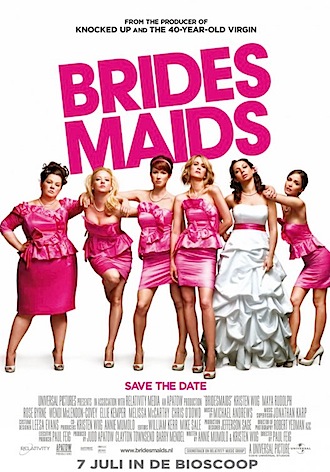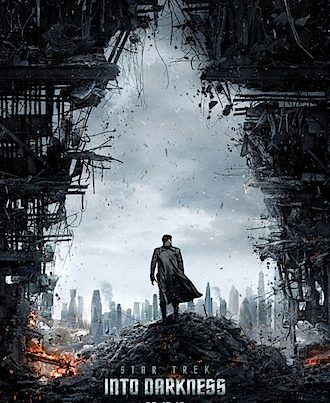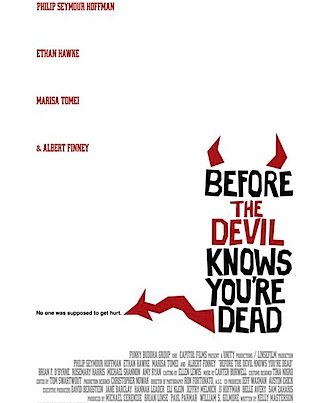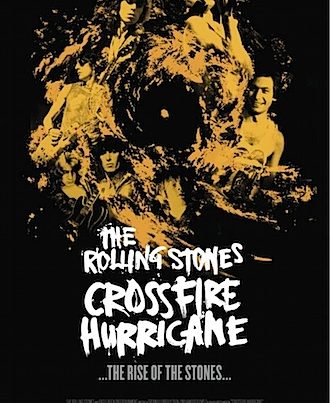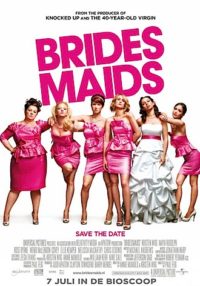 After years of auteur theory we have become conditioned to describe films as products of their director and so in my first draft of this review I started off talking about Paul Feig’s Bridesmaids. But it isn’t really Paul Feig’s Bridesmaids, it’s Kristen Wiig’s Bridesmaids. She co-wrote it (with Annie Mumolo), co-produced it and stars in it as Annie, a thirty-something single woman living in Milwaukee, having a hard time of things (but a comedy hard time of things, this isn’t Down to the Bone or something from Romania).
After years of auteur theory we have become conditioned to describe films as products of their director and so in my first draft of this review I started off talking about Paul Feig’s Bridesmaids. But it isn’t really Paul Feig’s Bridesmaids, it’s Kristen Wiig’s Bridesmaids. She co-wrote it (with Annie Mumolo), co-produced it and stars in it as Annie, a thirty-something single woman living in Milwaukee, having a hard time of things (but a comedy hard time of things, this isn’t Down to the Bone or something from Romania).
Still, she’s lost all her money in a failed baking business (blamed on the economy not her marvellous cakes), she’s flatting with two awful English siblings who have no idea of boundaries and her best friend (Maya Rudolph from Away We Go) is getting married while she is in an entirely unsatisfactory ‘friends with benefits’ arrangement with douche Jon Hamm.
This is all just set up though for a predictable but amusing romp through wedding preparations, bridal showers, bachelorette parties, etc along with the arrival of a laid back Irish traffic cop (Chris O’Dowd) who might have romantic potential if only Annie could see past her own nose.
Wiig has always been an appealing presence in other people’s films (most recently Paul with Simon Pegg) and totally justifies her top billing here, but the film as a whole could’ve done with some more ruthlessness at the editing workstation and relies too much on low-brow biological humour for my delicate sensibilities.
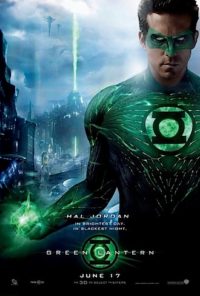 I was unaware of the Green Lantern comic book universe before sitting down to enjoy the Martin Campbell’s 3D version at the Embassy the other night – and I did enjoy it. Test pilot Hal Jordan (Ryan Reynolds) is given a glowing green ring by a dying purple alien (Tem Morrison) and told that he’s now an intergalactic peacekeeper, part of an élite unit, best of the best, etc.
I was unaware of the Green Lantern comic book universe before sitting down to enjoy the Martin Campbell’s 3D version at the Embassy the other night – and I did enjoy it. Test pilot Hal Jordan (Ryan Reynolds) is given a glowing green ring by a dying purple alien (Tem Morrison) and told that he’s now an intergalactic peacekeeper, part of an élite unit, best of the best, etc.
With the ring, and the green lantern that powers it, Jordan can manufacture anything he imagines out of pure green energy giving the digital animators plenty of possibilities to work with during fight scenes. Whisked to the Lanterns’ base planet of Oa for training he pikes when he thinks he’s not up to the job. Redemption comes when he is almost immediately asked to defend Earth from a planet sized smog monster called Parallax.
Refreshingly unpretentious, Green Lantern also has a set of modestly decent values to promote: if I was about ten years old I’d think Green Lantern was pretty cool and want to see another one. Oh, what the heck! I’m not ten years old and I’d like to see another one.
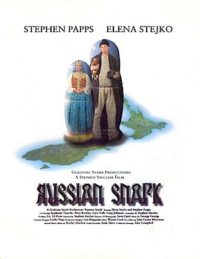 One of the occupational hazards of this gig is reviewing films that have been made by mates and I think it’s only fair that I own up to that here. I’ve known actor Stephen Papps for something like 20 years and I’m pleased to report that he has finally got a leading role worthy of his tall, angular and lugubrious talents.
One of the occupational hazards of this gig is reviewing films that have been made by mates and I think it’s only fair that I own up to that here. I’ve known actor Stephen Papps for something like 20 years and I’m pleased to report that he has finally got a leading role worthy of his tall, angular and lugubrious talents.
In Stephen Sinclair’s Russian Snark, Pappsy plays Misha, a naïve and single-minded Russian arthouse filmmaker who arrives in Auckland by boat to start a new life with partner and muse Nadia (Elena Stejko). As you might expect, New Zealand funding bodies are not particularly receptive to his brand of cinematic magniloquence (although his ‘nudes in landscapes’ style would surely have found an audience somewhere…) and Nadia is forced into some uncomfortable compromises to keep their heads above water.
Sinclair’s script is at its most interesting during Papps’ voiceover musings on the nature of art, though less so in the day to day scenes. I wish Russian Snark had more of the courage of its convictions – the title itself is an unnecessary and not particularly apt pun.
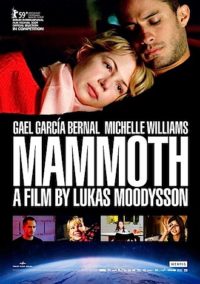 Lukas Moodysson’s Mammoth is a beautiful and important film and as it is only playing weekday sessions at the Roxy in Miramar it’s almost impossible to actually see. A wealthy video game designer (Gael García Bernal) visits Thailand to sign an important contract leaving his trauma surgeon wife (Michelle Williams), their daughter and her Filipino nanny (Marife Necesito) behind in their huge New York loft apartment.
Lukas Moodysson’s Mammoth is a beautiful and important film and as it is only playing weekday sessions at the Roxy in Miramar it’s almost impossible to actually see. A wealthy video game designer (Gael García Bernal) visits Thailand to sign an important contract leaving his trauma surgeon wife (Michelle Williams), their daughter and her Filipino nanny (Marife Necesito) behind in their huge New York loft apartment.
While he is away all the characters suffer some form of crisis, forced to confront their privileged (or otherwise) lives and the unforeseen consequences of the choices they have made. I’ll take Moodysson’s humanist rage at the injustices borne by the children of the world over Iñárritu’s overbearing metaphysics any day.
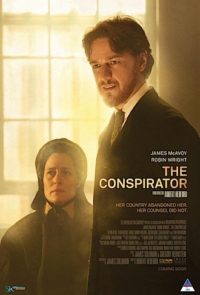 With The Conspirator, Robert Redford makes another attempt to weave modern day allegory out of history with mixed dramatic results. Following President Lincoln’s assassination, the US Government tried all of the conspirators in a military tribunal rather than a civilian court, including Mary Surratt (Robin Wright), the mother of one of the (I suppose) terrorists despite having no evidence against her.
With The Conspirator, Robert Redford makes another attempt to weave modern day allegory out of history with mixed dramatic results. Following President Lincoln’s assassination, the US Government tried all of the conspirators in a military tribunal rather than a civilian court, including Mary Surratt (Robin Wright), the mother of one of the (I suppose) terrorists despite having no evidence against her.
Short of cladding all of the accused in orange jump-suits I’m not sure what else Mr Redford could have done to make his point – that suspending natural justice in favour of national security is The American Way and always has been.
Printed in Wellington’s Capital Times on Wednesday 24 June, 2011.

